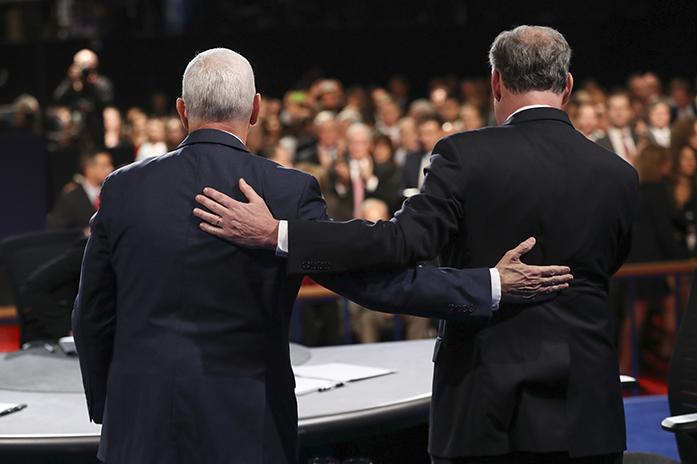By Mitch McAndrew
The vice-presidential candidates of the major parties are widely perceived as “nice guys” — but Republican Mike Pence and Democrat Tim Kaine showed their attack-dog sides when defending their respective presidential tickets at the vice-presidential debate on Tuesday night in Virginia.
While Pence and Kaine grilled each other on their own records, they also spent significant amounts of time defending attacks on their running mates.
Pence, a longtime politician, had to make a case for someone who is not a politician to be president, a unique spot to be in.
“Given all of the expectations that were on Pence to resurrect the Trump campaign, I think Pence did the best he could to meet those expectations,” said David Hingstman, a University of Iowa communication-studies associate professor and UI debate team coach.
Gayle Alberda, a political-science professor at Fairfield University in Connecticut, said Pence’s performance defending Donald Trump had good and bad components.
“In a way, [vice-presidential candidates] have to play the attack dog. As far as playing that role, he did a phenomenal job in that sense,” she said. “But in this election, with a lot more voters and media organizations focused on fact checking … Pence walked himself into a corner a couple of times.”
Kaine, on the other hand, pressed Pence repeatedly on controversial comments Trump has made while praising Hillary Clinton’s ability to build coalitions.
“It gave Kaine an advantage when he said Hillary Clinton has worked across the aisle and she will work across the aisle wen she gets in the White House,” Hingstman said.
Alberda said that Kaine struggled to fit his defenses of Clinton into simple, memorable phrases — something she said could lose the American public’s interest.
“His problem is not that he didn’t do a good job, but we want the 30-second sound bites,” she said. “When something is more complicated than that, it tends to get lost.”
Hingstman said that although some may have perceived Kaine’s aggressive approach as rude, it was enough to keep Pence on his heels.
“Tim Kaine wanted to put Mike Pence on the defensive about Donald Trump, and Pence did his best, but it was difficult for him to get a coherent defense out,” he said. “Particularly when he was getting interrupted quite often.”
He chalked the differences in debate style up to regional tendencies, saying that Pence’s midwestern politeness and Kaine’s Virginia assertiveness shone through.
Arthur Sanders, a professor of political science at Drake University, said the focus on the presidential ticket is largely the point of the vice-presidential debate.
“Vice-presidential debates are usually looked at as opportunities to judge the judgment of the presidential candidates,” he said. “Did they pick somebody who’s up to the job?”
Sanders said last week’s presidential debate, in which he said Clinton was “widely seen as coming across more effectively,” meant more pressure on Pence to minimize the damage.
“[Trump’s debate performance] raised the stakes for Gov. Pence,” Hingstman said. “If he does not come across well, it’s not that people won’t necessarily like him, but it will be another piece of evidence that Donald Trump doesn’t have the judgment needed in a president.”
Kaine’s main objective was to maintain any edge that Clinton may have following last week’s debate, but the Virginia senator will also have to make himself familiar to a national public that remains somewhat unfamiliar with him, Hingstman said.
While Tuesday night’s debate was important for voters’ Nov. 8 decision, it will likely have no effect in the presidential race’s national standings, Sanders said.
“Historically, the common impact of vice presidential debates is zero impact,” he said. “Most likely, this debate will be the same.”



